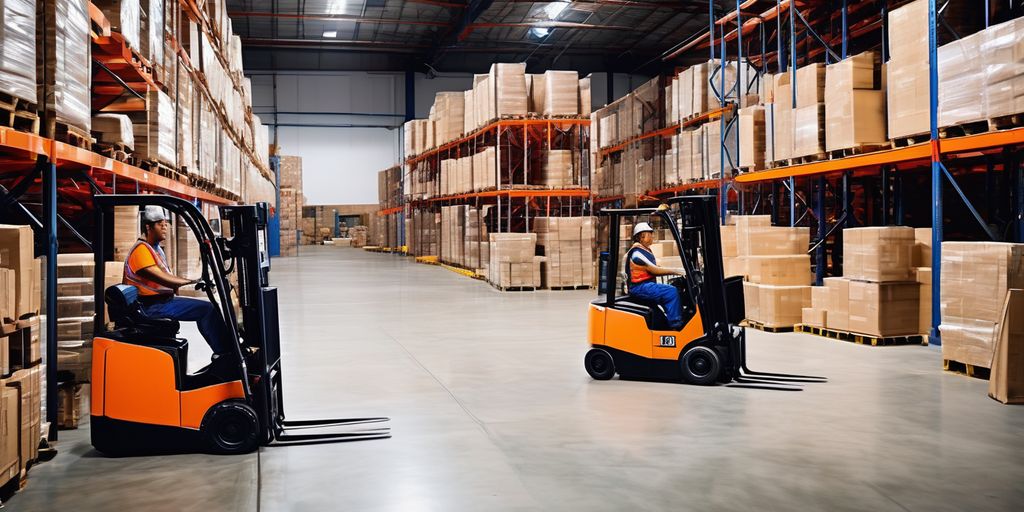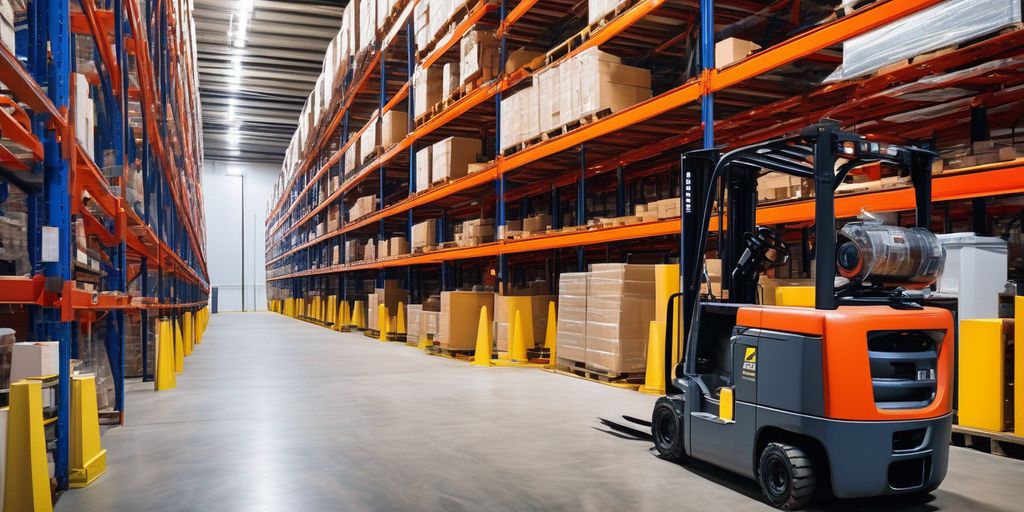5 Common Forklift Maintenance Mistakes to Avoid — overview
Forklifts are indispensable in various industries for moving heavy loads efficiently. However, their operation involves significant risks if not maintained properly. Regular maintenance is crucial to ensure safety and extend the lifespan of these machines. This article highlights five common forklift maintenance mistakes that can lead to severe accidents and high repair costs if ignored.
Key Takeaways
- Ignoring early warning signs of forklift issues can lead to major malfunctions and safety hazards.
- Regular inspections are essential to catch problems early and maintain forklift efficiency.
- Proper brake maintenance is not just a regulatory requirement but a critical safety measure.
- Keeping track of fluid levels, including hydraulic and brake fluids, ensures smooth operation and prevents damage.
- Regularly checking and maintaining tire condition is vital for safe forklift operation and can prevent accidents.
1. Ignoring Warning Signs

Ignoring warning signs in forklift operations can lead to severe consequences. Turning a blind eye to increasingly problematic operations is a significant mistake. If your forklift shows any concerning symptoms, addressing them promptly is crucial. Waiting and hoping issues will resolve themselves only worsens the problem.
- Immediate attention is required for any unusual noises or leaking hydraulics.
- Conduct thorough inspections regularly to catch issues early.
It's essential to address even the slightest signs of wear and tear as soon as possible to prevent major repairs.
Ignoring warning signs not only risks the lifespan of the forklift but also the safety of your employees. As soon as you notice any abnormal behavior, have the forklift checked by a professional.
2. Not Inspecting Forklifts Regularly

Regular inspection of forklifts is crucial to ensure their safe and efficient operation. Daily inspections can help identify potential issues before they lead to equipment failure or accidents. It's essential to follow a comprehensive checklist that includes checking the forklift's tires, brakes, and fluid levels.
By adhering to a regular inspection schedule, you can significantly reduce the risk of breakdowns and extend the lifespan of the forklift.
Key Inspection Intervals
- Daily: Check for any leaks, unusual noises, and general wear and tear.
- Monthly: Inspect the hydraulic systems and lifting mechanisms.
- Quarterly and Semi-Annually: Review and test all safety features and controls.
Failing to maintain a regular inspection schedule can lead to serious malfunctions and dangerous consequences. Regular inspections not only ensure smooth operation but also enhance productivity and lower maintenance costs.
3. Failing to Conduct Proper Brake Maintenance

Regular forklift maintenance is crucial to ensure the safety and efficiency of operations. Proper brake maintenance is essential to avoid potential disasters. Before every shift, it's important to check the brake fluid level, brake pedal, and parking brake. This routine check helps in identifying any issues that might compromise the forklift's braking performance.
Ensuring that the forklift brakes are functioning properly should be a priority during pre-shift inspections.
Here are some key steps to follow for effective brake maintenance:
- Check the brake fluid level and top it up if necessary.
- Inspect the brake pedal for any signs of stiffness or unusual resistance.
- Test the parking brake to ensure it engages and releases properly.
- Listen for any unusual noises when the brakes are applied.
- Schedule regular maintenance checks to assess the overall condition of the brakes and address any issues immediately.
4. Neglecting Fluid Levels

Neglecting the fluid levels in a forklift can lead to severe operational issues and safety hazards. Proper maintenance of fluid levels is crucial for the smooth operation of the forklift. This includes checking and refilling the hydraulic fluids, engine oil, and coolant as necessary. Inadequate levels can prevent the forklift from functioning correctly and may even cause damage to the machinery.
- Hydraulic fluids: Essential for the lifting mechanism. Low levels can lead to poor lifting performance or failure.
- Engine oil: Keeps the engine components lubricated and running smoothly.
- Coolant: Prevents the engine from overheating during operations.
Always consult the user manual for the correct specifications and procedures for checking and refilling these fluids. Failure to maintain adequate fluid levels can not only impede your ability to complete tasks but also pose significant safety risks.
5. Overlooking Tire Condition

Overlooking the condition of forklift tires can lead to significant safety hazards and operational inefficiencies. Worn or improperly maintained tires can cause slips, tip-overs, and collisions, which are critical risks in any workplace. To ensure optimal performance and safety, it's essential to implement a regular inspection and maintenance schedule for the tires. During these inspections, check for:
- Adequate tire pressure
- Signs of wear and tear such as cuts or bulges
- Even wear across the tire surface
Replacing tires at the first sign of damage not only enhances safety but also improves maneuverability and load stability. This proactive approach prevents minor issues from escalating into major problems that could jeopardize both safety and productivity.
Conclusion
In conclusion, maintaining forklifts properly is crucial for ensuring safety and efficiency in operations where these machines are used. By understanding and avoiding the common maintenance mistakes outlined in this article, operators and managers can significantly reduce the risk of accidents and extend the lifespan of their equipment. Regular inspections, proper handling of warning signs, and adherence to safety protocols are essential steps in fostering a safe working environment. Remember, the cost of prevention is always lower than the cost of repair or, worse, dealing with accidents. Stay proactive in your maintenance routines to keep your forklifts—and your operations—running smoothly.
Frequently Asked Questions
What are the most common forklift maintenance mistakes?
The most common forklift maintenance mistakes include ignoring warning signs, not inspecting forklifts regularly, failing to conduct proper brake maintenance, neglecting fluid levels, and overlooking tire condition.
Why is regular inspection crucial for forklift maintenance?
Regular inspection is crucial to identify signs of wear and tear early, ensuring that all components like tires, brakes, and steering are in good condition and preventing accidents.
How can ignoring warning signs affect forklift operation?
Ignoring warning signs can lead to serious accidents and malfunctions, as small issues may develop into major problems if not addressed promptly.
What should be checked during a forklift inspection?
During a forklift inspection, check the tires for wear, cracks, and bulges, the brakes, steering, and fluid levels to ensure everything is operating safely.
How does proper brake maintenance impact forklift safety?
Proper brake maintenance ensures that the forklift can stop effectively, preventing accidents and enhancing safety during operations.
What are the consequences of neglecting forklift maintenance?
Neglecting forklift maintenance can lead to increased repair costs, reduced productivity, and higher risks of workplace accidents and injuries.




Leave a comment
This site is protected by hCaptcha and the hCaptcha Privacy Policy and Terms of Service apply.